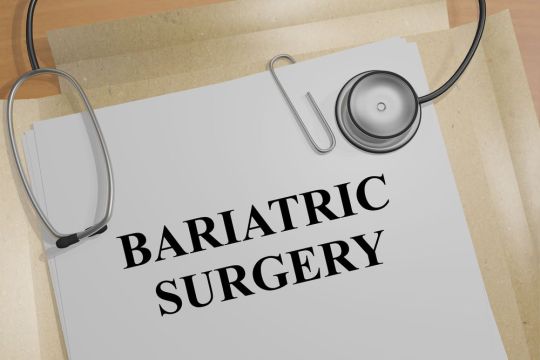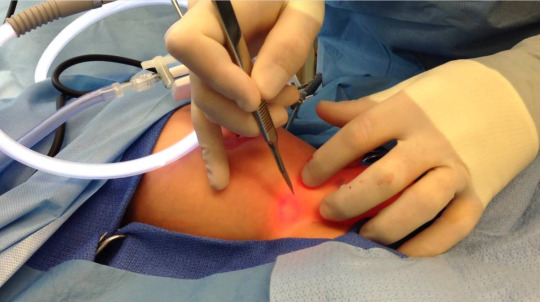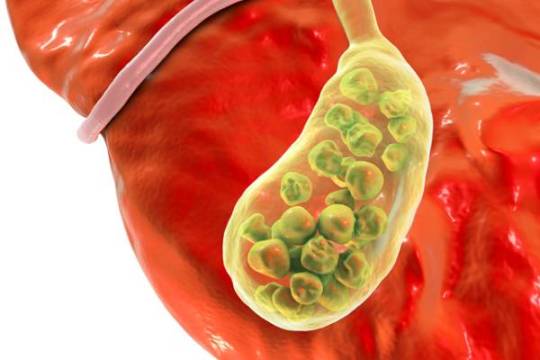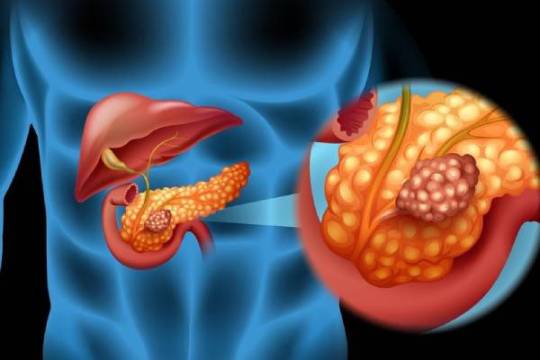Text
All you need to know about bariatric surgery – Gastrointestinal surgery
Bariatric surgery is a Gastrointestinal surgery to improve, prevent and/or treat obesity and its comorbidities which may be life-threatening. This is a life-saving surgery and not cosmetic surgery. The surgery is done by laparoscopy and does not involve the removal of fat from the body like liposuction. Weight loss after surgery is gradual i.e. 4-5 kgs per month and reaches a stable level after 1-2 years after surgery. Bariatric surgery is known to be the most effective and long-lasting treatment for morbid obesity and many related conditions. It is also one of the best treatments for metabolic diseases and conditions including Type-2 Diabetes, Hypertension, High cholesterol, Non-alcoholic fatty liver disease, and Obstructive sleep apnea.

Here are a few things you must know about Bariatric surgery.
1. The operation is safe.
All surgeries come with risks, but weight-loss surgery is as safe as having a gallbladder removed. Patients usually go home the next day.
2. Weight loss
A patient might lose 70 kgs and gain back 15 kgs to 25 kgs. Part of this is simply the body adjusting to the “new norm” and learning to store fat even on a very restricted diet.
3. You will keep the weight off.
85 to 90% of patients are successful in losing weight and significantly improving their quality of life. However, momentary lapses can happen.
4. You will become healthier overall.
When patients lose weight, they improve their health, too. The risk of heart attack and stroke goes down. Diabetes improves, and some individuals no longer need insulin. Individuals breathe better and sleep better. It becomes easier to walk and exercise too.
5. You can still eat regular food.
Gathering around a food table is such an important part of our culture, and that doesn’t have to change after weight-loss surgery. Patients learn to eat healthier foods and smaller portions, but they can still enjoy a meal with friends and family.
Bariatric surgery is the new face of weight loss. It is not only safe but is also effective. It doesn’t have many side effects too. Anyone can go for it. Consult your doctor for expert advice.
#Bariatric Surgeon in Pune#Bariatric Surgery in pune#Gastrology cancer surgery in Pune#Gastroenterologist in Pune#Gastrointestinal Surgical in Pune
0 notes
Link
Dr. Nikhil Jillawar is an eminent Laparoscopic Surgeon in Pune, providing specialized treatment in the field of Gastroenterology including Piles, Fistula/fissure treatment, Pancreatic Surgery, Trauma Surgery, Laparoscopic hernia surgery in Pune.
0 notes
Text
Laparoscopic surgeon in Pune - Dr. Nikhil Jillawar
Laparoscopy is used in diagnosis when non-invasive methods can't diagnose a condition, and surgeries performed are via small incisions, which increases postoperative patient recovery, reduces blood loss and pain, and significantly improve cosmesis.
Diagnosis options are offered through laparoscopy for Pelvic inflammatory disease (PID), Endometriosis, Ectopic pregnancy, Ovarian cyst, Fibroids, Female infertility, Undescended testicles, Appendicitis, Unexplained abdominal pain, Liver cancer, Pancreatic cancer, Ovarian cancer, Bile duct cancer, Gallbladder cancer.

Surgical options offered through laparoscopy are meant for removing an inflamed appendix, removing the gallbladder to treat gallstones, Crohn's disease or diverticulitis, Hernia repair, stomach ulcers, Gastrectomy, Oncological surgery, Ectopic pregnancy, removing fibroids, and hysterectomy. Manipal Hospitals help manage pain and restore function in the most uncomplicated way possible. Offering Laparoscopic, minimally invasive procedures, our experts ensure patient's recovery and improved quality of life with the least invasive, most appropriate, and most advanced treatment available.
Laparoscopic surgery is unquestionably advantageous in terms of patient outcomes. But the procedure is quite complex from the surgeon’s perspective. This cutting-edge procedure offers total and fast recovery from certain complications such as gall bladder stones, hernia, appendix, diseases of the gastrointestinal tract, varicose veins treatment, and gynecological disorder. A highly experienced surgeon with a specialization in general and laparoscopic surgery. Dr. Nikhil Jillawar is a well-known laparoscopic surgeon in Pune who Offers Laparoscopic hernia surgery in Pune.
Dr. Nikhil Jillawar is an eminent Laparoscopic Surgeon in Pune, providing specialized treatment in the field of Gastroenterology including Piles, Fistula/fissure treatment, Pancreatic Surgery, Trauma Surgery, Laparoscopic hernia surgery in Pune.
#Laparoscopic surgeon in Pune#laparoscopic hernia surgery in pune#Laparoscopic hernia surgery#Laparoscopy
0 notes
Text
Why undergo Laparoscopic Surgery for Hernia? laparoscopic Surgeon in Pune
A hernia is a condition in which parts of an organ, often in the abdomen, are displaced due to the weak muscular wall that keeps organs in place. It is the disease of the abdomen, but they can appear in other parts of the body, including the groin, belly button, and upper thighs.
Unlike other abdominal diseases, hernia is not very common and nearly only 5% of the population
develop hernia during their lifetime. The condition can be caused due to a combination of factors, for
instance, damage from injury, failure of the abdominal wall to close properly, chronic coughing, etc.
The individual suffering from a hernia can experience symptoms like a bulge or a lump in the affected area, pain or discomfort in the lower abdomen, feeling of heaviness in the abdomen, and aching sensation at the site of the bulge.
Laparoscopic Treatment In Pune
Sir Astely Paston Cooper has rightly said that “No disease of the human body, belonging to the province of the surgeon, requires in its treatment, a better combination of accurate, anatomical knowledge with surgical skills than hernia in all its variety.”
Since hernia tends to get bigger, it often leads to life-threatening complications. So, with the passage of time, many treatment procedures have been developed for hernia, including laparoscopy. The laparoscopic repairs have also undergone considerable evolution with time.
Some of the traditional laparoscopic techniques even received criticism due to their failure to demonstrate good result; and hence, were abandoned. However, these techniques become more advanced with the advancement in medical science and technology. Today, laparoscopy is one of the preferred and advised treatments for the condition due to the benefits it offers.

Why Patients Should Undergo laparoscopic surgery
The minimally invasive procedure of laparoscopic surgery can be used to repair most of the common hernias. Normally, three half-inch incisions are made in the abdomen instead of one large cut. A camera is then inserted to visualize the hernia and guide the surgeon’s movement.
The biggest advantage of undergoing this technique is it deals with the hernia at the point of its origin, exactly where it started appearing, making it a suitable approach.
Another advantage of the laparoscopic approach is the ability to view the fascial defects while avoiding the pitfalls of a tedious anterior dissection, making it less damaging to surrounding tissues. Also, there is a lower incidence of the abscess and wound infection post-operatively.
In addition, laparoscopic surgery has a much shorter recovery time, meaning a patient can get back to a normal routine, including work only after a few days.
Besides, postoperative pain is also minimal in these surgeries. With the development of newer techniques of laparoscopy, the surgeries are also becoming cost-effective, leading to greater social benefits.
Finally, after the procedure is completed, the abdominal notches fade away within a few months. Laparoscopy, when carried out by the hands of an satisfactorily trained surgeon, produces brilliant results as compared to open repairs and other conventional treatments.
Laparoscopic surgery is unquestionably advantageous in terms of patient outcomes. But the procedure is quite complex from the surgeon’s perspective. This cutting-edge procedure offers total and fast recovery from certain complications such as gall bladder stones, hernia, appendix, diseases of the gastrointestinal tract, varicose veins treatment, and gynecological disorder. A highly experienced surgeon with a specialization in general and laparoscopic surgery. Dr. Nikhil Jillawar is a well-known laparoscopic surgeon in Pune who Offers Laparoscopic hernia surgery in Pune.
0 notes
Text
How a Gastroenterologist Can Keep Your Liver Healthy
It’s no secret that a gastroenterologist is who you need to see for digestive problems or to have a colonoscopy. However, the exact scope of care provided by a gastroenterologist is often misunderstood. Beyond the gastrointestinal tract, these specialists also care for other organs that are involved in the process of digestion, including the gallbladder, pancreas, and liver.
Location and function of the Liver
The liver is located on the right side of the abdomen, above the gallbladder. It is divided into two separate lobes. As part of its role in digestive health, the liver is responsible for filtering blood and processing nutrients from the digestive tract, as well as secreting bile to aid in the digestion of fat. Additionally, it is responsible for detoxifying chemicals which could be potentially harmful to the body and metabolizing drugs.

Diseases that affect the Liver
Given the vital role it plays in healthy body function, disease of the liver can be serious and requires proper medical treatment. Among the conditions which may impact the liver are:
Hepatitis – Hepatitis is inflammation of the liver and is often the result of viral hepatitis A, B, or C. The severity of the condition depends on the specific type of hepatitis contracted. While hepatitis A resolves relatively quickly and without complication, hepatitis B and C can both lead to chronic liver infection.
Cirrhosis – Cirrhosis is damage to the liver from sources such as hepatitis or alcohol abuse that results in scarring. This damage is almost always irreversible, and severe cases may require a transplant.
Fatty Liver – Fatty liver is often a precursor to cirrhosis. It occurs due to the accumulation of triglycerides inside liver cells. In cases where a fatty liver becomes inflamed (steatohepatitis), scarring (fibrosis) may occur, and this is when cirrhosis can develop.
Liver Cancer – Hepatocellular carcinoma (HCC) is the most common type of liver cancer and is typically preceded by cirrhosis. When detected in the early stages before cancer has spread, the average 5-year survival rate is 31 percent.
How a Gastroenterologist cares for the Liver?
Due to its role in the digestive system, gastroenterologists are well-equipped to diagnose and treat many conditions of the liver. While some conditions may require care from multiple types of doctors, a skilled gastroenterologist is always a key component in the treatment of diseases impacting the gastrointestinal tract and related organs.
0 notes
Text
Gastrointestinal Surgical in Pune | Surgical Gastroenterologist in Pune
What is gastrointestinal cancer?
Gastrointestinal (GI) cancer is a term used for the group of cancers that affect the gastrointestinal tract and other organs that are contained within the digestive system, including the esophagus, pancreas, stomach, colon, rectum, anus, liver, biliary system, and small intestine.
Are GI cancers preventable?
Cancer prevention is an action taken to lower the chance of getting cancer. While there is no guarantee that you will not develop cancer, there are steps you can take to protect yourself. Making positive lifestyle changes (avoiding controllable risk factors) and visiting your doctor regularly for preventative screening are ways you can help lower your risk. Having gastrointestinal tract problems? Dr. Nikhil Jillawar is an eminent Surgical Gastroenterologist in Pune treating Diseases in the field of gastroenterology and providing specialized treatment in the field Gastrointestinal Surgical in Pune

What are the symptoms of GI cancers?
Symptoms of GI cancers can vary depending on the type of cancer. Some warning signs may include the following:
Abdominal pain
Constipation
Diarrhea
Change in stool color
Blood in the stool
Nausea
Vomiting
Fatigue
Jaundice (yellowing of the skin and whites of the eyes)
Heartburn
Unexplained weight loss
Feeling bloated
Problems swallowing
Loss of appetite
What are the risk factors for GI cancers?
Risk factors for gastrointestinal cancers vary among the different types. Some known general risk factors may include:
Age
Gender
Race
Smoking
Obesity
Physical inactivity
Heavy alcohol use
A family history of GI cancer
Having an inherited gene mutation that is known to increase your risk
History of other conditions such as type II diabetes, inflammatory bowel disease (IBS), Crohn’s disease, chronic acid reflux, cirrhosis, and chronic viral hepatitis B or C
What are the types of gastrointestinal cancer?
Anal Cancer: Anal cancer starts in the anal canal–a short tube at the end of your rectum through which stool leaves your body. The inner lining of the anal canal is the mucosa. Most anal cancers start from cells in the mucosa. Anal cancers that start from cells in the glands located under the mucosa are called adenocarcinomas. Many types of tumors can develop in the anus, including non-cancerous ones.
Colon and Rectal Cancer (Colorectal): Colorectal cancer starts in the colon or the rectum. These two cancers are often grouped together because they share many similar features. Most colorectal cancers begin as small, noncancerous (benign) clumps of cells, called polyps, on the inner lining of the colon or rectum. Regular screening is recommended for prevention since polyps don’t usually produce symptoms.
Esophageal Cancer: A cancer that occurs in the esophagus — a hollow, muscular tube that connects the throat to the stomach. It is located behind the trachea (windpipe) and in front of the spine. The esophagus helps move the food you swallow from the back of the throat to the stomach for digestion.
Gallbladder & Biliary Tract Cancer: Gallbladder cancer occurs when malignant cancer cells form in the tissues of the gallbladder. The gallbladder is a small, pear-shaped organ located next to the liver. Its role is to store bile, a fluid that aids with digestion and fat absorption in the small intestine. Biliary tract cancer (also known as cholangiocarcinoma) is cancer that occurs in the bile ducts (tubes that transport bile from the liver). Biliary tract cancer can form anywhere along the bile ducts.
Gastrointestinal Stromal Tumors (GIST): GISTs start in special cells, called interstitial cells of Cajal (ICCs), located in the wall of the gastrointestinal (GI) tract, also known as the digestive tract. ICC cells are part of the autonomic nervous system–the part of the nervous system that regulates body processes such as digesting food. The most common sites for GISTs are the stomach and small intestine.
Liver Cancer: Liver cancer starts in the cells of the liver. The liver, which is the largest internal organ, lies in the upper right portion of your abdomen, beneath your diaphragm and above your stomach. While other cancers can affect the liver, only cancers that actually start in the liver are considered liver cancer (called primary liver cancer). Hepatocellular carcinoma, which begins in the main type of liver cell (hepatocyte), is the most common type of liver cancer.
Pancreatic Cancer: Cancer that begins in the tissues of the pancreas — an organ that sits behind the stomach. It releases enzymes that help digest foods (especially fats) and hormones that help control blood sugar levels. The pancreas has two types of cells–exocrine and endocrine–which form different types of tumors.
Stomach Cancer: Stomach cancer, also called gastric cancer, starts in the stomach. While stomach cancer can develop anywhere in the organ, most stomach cancers develop in the mucus-producing cells of the stomach’s inner lining.
Small Intestine Cancer: Small intestine, also called small bowel cancer, occurs in the small intestine–a long tube that carries digested food between the stomach and the large intestine (colon). Because the small intestine is made up of many different types of cells, different types of cancer can start there. There are four major types of small intestine cancers, which include adenocarcinomas, carcinoid tumors, lymphomas, and sarcomas.
0 notes
Photo

Searching for Surgical Gastroenterologist in Pune? Dr. Nikhil Jillawar is a skilled & experienced gastroenterologist, providing specialized treatment.
0 notes
Link
Dr. Nikhil Jillawar is an eminent Surgical Gastroenterologist in Pune treating Diseases in the field of gastroenterology and providing specialized treatment in the field Gastrointestinal Surgical in Pune
0 notes
Text
laparoscopic gallbladder surgery in Pune
What is Gallstone?
Gallstones are pieces of solid material that form in your gallbladder, a small organ under your liver. If you have them, you might hear your doctor say you have cholelithiasis. Laparoscopic gallbladder surgery in Pune, it gives instant relief to the person from the pain due to blockage.
Your gallbladder stores and releases bile, a fluid made in your liver, to help indigestion. Bile also carries wastes like cholesterol and bilirubin, which your body makes when it breaks down red blood cells. These things can form gallstones.
Gallstones can range from the size of a grain of sand to that of a golf ball. You might not know that you have them until they block a bile duct, causing pain that needs treatment right away.

Gallstone Types
Cholesterol stones- These are usually yellow-green. They’re the most common, making up 80% of gallstones.
Pigment stones- These are smaller and darker. They’re made of bilirubin
Symptoms of Gallstones
Pain in your upper belly, often on the right, just under your ribs
Pain in your right shoulder or back
An upset stomach
Vomiting
Other digestive problems, including indigestion, heartburn, and gas
Causes of Gallstones
There’s too much cholesterol in your bile- Your body needs bile for digestion. It usually dissolves cholesterol. But when it can’t do that, the extra cholesterol might form stones.
There’s too much bilirubin in your bile- Conditions like cirrhosis, infections, and blood disorders can cause your liver to make too much bilirubin.
Your gallbladder doesn’t empty all the way- This can make your bile very concentrated.
What are the treatment options?
Most people with gallstones that don’t cause symptoms will never need treatment. Your doctor will determine if treatment for gallstones is indicated based on your symptoms and the results of diagnostic testing. Your doctor may recommend that you be alert for symptoms of gallstone complications, such as intensifying pain in your upper right abdomen. If gallstone signs and symptoms occur in the future, you can have treatment.
Treatment options for gallstones include:
Surgery to remove the gallbladder (cholecystectomy)- Your doctor may recommend surgery to remove your gallbladder since gallstones frequently recur. Once your gallbladder is removed, bile flows directly from your liver into your small intestine, rather than being stored in your gallbladder.
Medications to dissolve gallstones- Medications you take by mouth may help dissolve gallstones. But it may take months or years of treatment to dissolve your gallstones in this way, and gallstones will likely form again if treatment is stopped.
#laparoscopic gallbladder surgery in Pune#laparoscopic gallbladder surgeon in Pune#laparoscopic gallbladder surgery
0 notes
Photo

Laparoscopic gallbladder surgery in Pune, it gives instant relief to the person from the pain due to blockage.
0 notes
Link
Laparoscopic gallbladder surgery in Pune, it gives instant relief to the person from the pain due to blockage.
#laparoscopic gallbladder surgery in Pune#laparoscopic gallbladder doctors in Pune#laparoscopic gallbladder surgery
0 notes
Photo

Dr. Nikhil Jillawar is one of the leading experts in the Pune, providing Pancreatic cancer treatment in Pune.Book an appointment today!
0 notes
Text
Pancreatic cancer treatment in Pune | Pancreatic cancer
What is pancreatic cancer?
Pancreatic cancer occurs within the tissues of the pancreas, which is a vital endocrine organ located behind the stomach. The pancreas plays an essential role in digestion by producing enzymes that the body needs to digest fats, carbohydrates, and proteins.
The pancreas also produces two important hormones: glucagon and insulin. These hormones are responsible for controlling glucose (sugar) metabolism. Insulin helps cells metabolize glucose to make energy and glucagon helps raise glucose levels when they are too low. Dr. Nikhil Jillawar Has great experience of Pancreatic cancer. Now he is providing Pancreatic Cancer Treatment in Pune.
Due to the location of the pancreas, pancreatic cancer may be difficult to detect and is often diagnosed in more advanced stages of the disease.

Pancreatic cancer is caused by the abnormal and uncontrolled growth of cells in the pancreas, a large gland that’s part of the digestive system.
Pancreatic cancer symptoms
Pancreatic cancer often doesn’t show symptoms until it reaches the advanced stages of the disease. For this reason, there typically aren’t any early signs of pancreatic cancer.
Even once cancer has grown, some of the most common symptoms can be subtle. They include:
loss of appetite
unintentional weight loss
abdominal (stomach) or lower back pain
blood clots
depression
Pancreatic cancer causes
The cause of pancreatic cancer is unknown. This type of cancer occurs when abnormal cells begin to grow within the pancreas and form tumors.
Normally, healthy cells grow and die in moderate numbers. In the case of cancer, there is an increased amount of abnormal cell production, and these cells eventually take over healthy cells.
While doctors and researchers don’t know what causes the changes in the cells, they do know some common factors that may increase a person’s risk of developing this type of cancer.
The two most significant risk factors are inherited gene mutations and acquired gene mutations. Genes control the way cells act, so changes to those genes may lead to cancer.
Pancreatic cancer stages
When pancreatic cancer is discovered, doctors will likely perform additional tests to understand if or where cancer has spread. Imaging tests, such as a PET scan, help doctors identify the presence of cancerous growths. Blood tests may also be used.
With these tests, doctors are attempting to establish cancer’s stage. Staging helps explain how advanced the cancer is. It also helps doctors determine treatment options.
Once a diagnosis has been made, your doctor will assign a stage based on the test results:
Stage 1: tumors exist in the pancreas only
Stage 2: tumors have spread to nearby abdominal tissues or lymph nodes
Stage 3: cancer has spread to major blood vessels and lymph nodes
Stage 4: tumors have spread to other organs, such as the liver
0 notes
Link
Dr. Nikhil Jillawar Has great experience of Pancreatic cancer. Now he is providing Pancreatic Cancer Treatment in Pune.
0 notes
Text
Bariatric Surgeon in Pune, Bariatric Surgery in Pune
What is Bariatric Surgery?
Bariatric surgery is nothing but the common term collectively used for many types of weight-loss surgeries. These surgeries make changes to your digestive system to help you lose weight. They either limit the amount of food you can intake or reduce your ability to absorb nutrition and in some cases both. Tackle your obesity issues, get treatment for Metabolic and Bariatric Surgery in Pune from well known metabolic & Bariatric surgeons in Pune, He specializes in all types of treatment & surgeries for obesity.
Such types of surgeries are done when diet or exercise plans have not worked out for the person and when the person has some serious health condition as a result of their weight. Gastric bypass is the most common type of bariatric surgery and most surgeons prefer this surgery as it usually has fewer complications than other weight-loss surgeries do.

These surgeries generally pose major risks and side effects and the patient has to make changes to their diet permanently and also schedule a fixed exercise regime so that they can ensure the lasting success of bariatric surgeries.
Who needs bariatric surgery?
Bariatric surgery is an alternative for losing weight after all other options such as dieting, regular exercising, and working out have failed. This surgery is recommended for those:
Having a Body Mass Index (BMI) of 40 or higher.
People, who are obese and have several weight-related problems like type 2 diabetes, sleep apnoea, or high blood pressure.
Types of Weight Loss/Bariatric surgeries
Biliopancreatic diversion with duodenal switch (BPD/DS).
Endoscopic sleeve gastroplasty.
Gastric bypass (Roux-en-Y)
Intragastric balloon
Sleeve gastrectomy
Is Bariatric surgery right for you?
Bariatric surgeries may not be suitable for everyone and so they are only performed if there is a serious health threat or impediment to the patient due to their excessive weight. It is not advised as a cosmetic procedure as there are serious risks and complications that may arise.
Risks and Complications of Bariatric Surgery
Excessive bleeding
Infection
Adverse reaction to anesthesia
Blood clots
Lung or breathing problems
Leaks in the gastrointestinal system
#Bariatric Surgeon in Pune#Bariatric Surgery in Pune#Bariatric Surgeon#Bariatric Surgery#weight loss#weight loss treatment
0 notes
Link
get treatment for Metabolic and Bariatric Surgery in Pune from well known metabolic & Bariatric Surgeon in Pune, He specializes in all types of treatment & surgeries for obesity.
#Bariatric Surgeon in Pune#bariatric surgery in pune#Bariatric Surgeon#Bariatric Surgery#weight loss#weight loss treatment
0 notes
Photo

"Dr. Nikhil Jillawar is a well known metabolic & bariatric surgeon in pune, He specializes in all types of treatment & surgeries for obesity."
0 notes